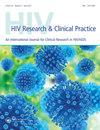Early switching of tenofovir disoproxil fumarate (TDF) in HIV-infected patients with TDF-induced nephrotoxicity: a prospective study
IF 1.8
4区 医学
Q3 INFECTIOUS DISEASES
引用次数: 0
Abstract
Background: Tenofovir disoproxil fumarate (TDF) can induce proximal renal tubulopathy (PRT) and necessitate changes in treatment regimen. This prospective study aimed to compare tubular function recovery following early switching versus late switching of TDF in human immunodeficiency virus (HIV)-infected patients with TDF-induced PRT. Methods: For this prospective study, conducted during 2017–2019, we enrolled HIV-1-infected, virologically suppressed adults undergoing TDF-containing combination antiretroviral therapy. Patients were separated into a late-switching group (LSG) and an early-switching group (ESG). The LSG included patients having an estimated glomerular filtration rate (eGFR) decrease ≥25% from the pretreatment level or Fanconi syndrome. The ESG included patients having ≥2 of the following indicators of PRT: fractional excretion of phosphate (FEUP) ≥10%, low tubular maximum reabsorption of phosphate (TmP)/GFR, or uricosuria; fractional uric acid excretion ≥10%; urine protein–creatinine index (UPCI) ≥500 mg/g creatinine, normoglycemic glycosuria, or decrease in eGFR of 15%–24%. Recovery of proximal tubular function at 6 and 12 months after TDF discontinuation was assessed. Complete recovery was defined as normalization of all abnormal tubular markers. Results: Thirty-three HIV-infected patients were enrolled (70% male). Except for tubular function markers, baseline characteristics were not significantly different between the two groups. The proportion of patients having complete recovery was significantly higher in the ESG (p = 0.007, log-rank test). FEUP improved significantly in the ESG after TDF discontinuation; improvements of eGFR and UPCI were greater in the LSG. An eGFR change of 10% from baseline was the only independent predictor of failure to achieve complete recovery after switching. After median follow-up of 2.25 years post-trial, sustained recovery of eGFR within 5% of pre-TDF eGFR was achieved only in the ESG. Conclusions: Early-switching of TDF in HIV patients with PRT may allow complete recovery of proximal renal tubular function.富马酸替诺福韦二氧吡酯(TDF)在TDF引起肾毒性的hiv感染患者中的早期切换:一项前瞻性研究
背景:富马酸替诺福韦二氧吡酯(TDF)可引起近端肾小管病变(PRT),需要改变治疗方案。这项前瞻性研究旨在比较人类免疫缺陷病毒(HIV)感染的TDF诱导PRT患者TDF早期转换和晚期转换后的小管功能恢复情况。方法:在2017-2019年进行的这项前瞻性研究中,我们招募了接受含tdf联合抗逆转录病毒治疗的hiv -1感染、病毒学抑制的成年人。将患者分为晚转换组(LSG)和早转换组(ESG)。LSG包括估计肾小球滤过率(eGFR)较预处理水平下降≥25%或Fanconi综合征的患者。ESG包括具有以下2项PRT指标的患者:磷酸盐分数排泄(FEUP)≥10%,低管状磷酸盐最大重吸收(TmP)/GFR,或尿尿;分数尿酸排泄≥10%;尿蛋白-肌酐指数(UPCI)≥500mg /g肌酐,血糖正常,或eGFR下降15%-24%。评估TDF停药后6个月和12个月近端小管功能恢复情况。完全恢复定义为所有异常管状标志物归一化。结果:纳入33例hiv感染者,其中70%为男性。除肾小管功能标志物外,两组患者的基线特征无显著差异。ESG中完全恢复的患者比例显著高于对照组(p = 0.007, log-rank检验)。停用TDF后,FEUP在ESG方面显著改善;eGFR和UPCI在LSG组的改善更大。eGFR较基线变化10%是转换后无法完全恢复的唯一独立预测因子。试验后中位随访2.25年,eGFR持续恢复在tdf前eGFR的5%以内,仅在ESG中实现。结论:HIV合并PRT患者早期切换TDF可使近端肾小管功能完全恢复。
本文章由计算机程序翻译,如有差异,请以英文原文为准。
求助全文
约1分钟内获得全文
求助全文

 求助内容:
求助内容: 应助结果提醒方式:
应助结果提醒方式:


